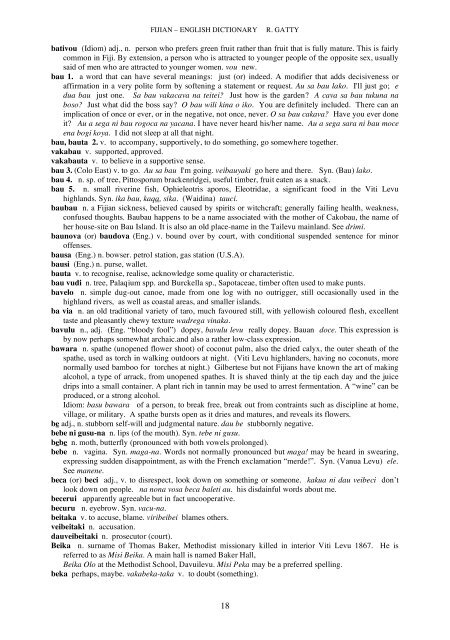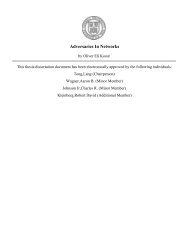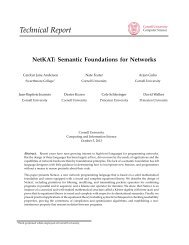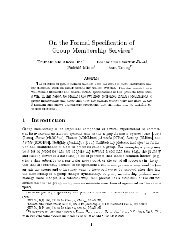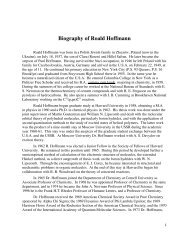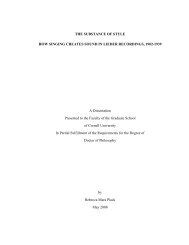Fijian-English Dictionary - eCommons@Cornell - Cornell University
Fijian-English Dictionary - eCommons@Cornell - Cornell University
Fijian-English Dictionary - eCommons@Cornell - Cornell University
You also want an ePaper? Increase the reach of your titles
YUMPU automatically turns print PDFs into web optimized ePapers that Google loves.
FIJIAN – ENGLISH DICTIONARY R. GATTY<br />
bativou (Idiom) adj., n. person who prefers green fruit rather than fruit that is fully mature. This is fairly<br />
common in Fiji. By extension, a person who is attracted to younger people of the opposite sex, usually<br />
said of men who are attracted to younger women. vou new.<br />
bau 1. a word that can have several meanings: just (or) indeed. A modifier that adds decisiveness or<br />
affirmation in a very polite form by softening a statement or request. Au sa bau lako. I'll just go; e<br />
dua bau just one. Sa bau vakacava na teitei? Just how is the garden? A cava sa bau tukuna na<br />
boso? Just what did the boss say? O bau wili kina o iko. You are definitely included. There can an<br />
implication of once or ever, or in the negative, not once, never. O sa bau cakava? Have you ever done<br />
it? Au a sega ni bau rogoca na yacana. I have never heard his/her name. Au a sega sara ni bau moce<br />
ena bogi koya. I did not sleep at all that night.<br />
bau, bauta 2. v. to accompany, supportively, to do something, go somewhere together.<br />
vakabau v. supported, approved.<br />
vakabauta v. to believe in a supportive sense.<br />
bau 3. (Colo East) v. to go. Au sa bau I'm going. veibauyaki go here and there. Syn. (Bau) lako.<br />
bau 4. n. sp. of tree, Pittosporum brackenridgei, useful timber, fruit eaten as a snack.<br />
bau 5. n. small riverine fish, Ophieleotris aporos, Eleotridae, a significant food in the Viti Levu<br />
highlands. Syn. ika bau, kaqa, sika. (Waidina) tauci.<br />
baubau n. a <strong>Fijian</strong> sickness, believed caused by spirits or witchcraft; generally failing health, weakness,<br />
confused thoughts. Baubau happens to be a name associated with the mother of Cakobau, the name of<br />
her house-site on Bau Island. It is also an old place-name in the Tailevu mainland. See drimi.<br />
baunova (or) baudova (Eng.) v. bound over by court, with conditional suspended sentence for minor<br />
offenses.<br />
bausa (Eng.) n. bowser. petrol station, gas station (U.S.A).<br />
bausi (Eng.) n. purse, wallet.<br />
bauta v. to recognise, realise, acknowledge some quality or characteristic.<br />
bau vudi n. tree, Palaqium spp. and Burckella sp., Sapotaceae, timber often used to make punts.<br />
bavelo n. simple dug-out canoe, made from one log with no outrigger, still occasionally used in the<br />
highland rivers, as well as coastal areas, and smaller islands.<br />
ba via n. an old traditional variety of taro, much favoured still, with yellowish coloured flesh, excellent<br />
taste and pleasantly chewy texture wadrega vinaka.<br />
bavulu n., adj. (Eng. “bloody fool”) dopey, bavulu levu really dopey. Bauan doce. This expression is<br />
by now perhaps somewhat archaic.and also a rather low-class expression.<br />
bawara n. spathe (unopened flower shoot) of coconut palm, also the dried calyx, the outer sheath of the<br />
spathe, used as torch in walking outdoors at night. (Viti Levu highlanders, having no coconuts, more<br />
normally used bamboo for torches at night.) Gilbertese but not <strong>Fijian</strong>s have known the art of making<br />
alcohol, a type of arrack, from unopened spathes. It is shaved thinly at the tip each day and the juice<br />
drips into a small container. A plant rich in tannin may be used to arrest fermentation. A “wine” can be<br />
produced, or a strong alcohol.<br />
Idiom: basu bawara of a person, to break free, break out from contraints such as discipline at home,<br />
village, or military. A spathe bursts open as it dries and matures, and reveals its flowers.<br />
be adj., n. stubborn self-will and judgmental nature. dau be stubbornly negative.<br />
bebe ni gusu-na n. lips (of the mouth). Syn. tebe ni gusu.<br />
bebe n. moth, butterfly (pronounced with both vowels prolonged).<br />
bebe n. vagina. Syn. maga-na. Words not normally pronounced but maga! may be heard in swearing,<br />
expressing sudden disappointment, as with the French exclamation “merde!”. Syn. (Vanua Levu) ele.<br />
See manene.<br />
beca (or) beci adj., v. to disrespect, look down on something or someone. kakua ni dau veibeci don’t<br />
look down on people. na nona vosa beca baleti au. his disdainful words about me.<br />
becerui apparently agreeable but in fact uncooperative.<br />
becuru n. eyebrow. Syn. vacu-na.<br />
beitaka v. to accuse, blame. viribeibei blames others.<br />
veibeitaki n. accusation.<br />
dauveibeitaki n. prosecutor (court).<br />
Beika n. surname of Thomas Baker, Methodist missionary killed in interior Viti Levu 1867. He is<br />
referred to as Misi Beika. A main hall is named Baker Hall,<br />
Beika Olo at the Methodist School, Davuilevu. Misi Peka may be a preferred spelling.<br />
beka perhaps, maybe. vakabeka-taka v. to doubt (something).<br />
18


